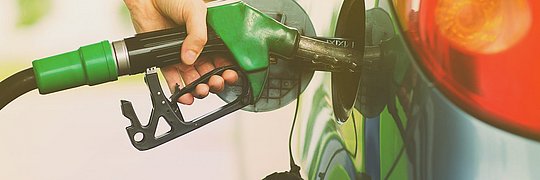
Biomethane as a fuel
-
Since 2006, Germany has stipulated that a certain proportion of biofuels must be added to the sale of fuels, known as the biofuel quota. The quota obligation, which actually only applies to diesel and petrol, can be fulfilled by using biomethane in natural gas vehicles. The mineral oil company subject to the quota obligation can make use of third parties (so-called quota trading). In addition to the introduction of the biofuel quota, tax concessions have been granted in the past for certain biofuels such as biomethane. However, the tax concessions for biofuels were gradually reduced and finally expired at the end of 2015 (Section 50 (2) EnergieStG).
The regulations on the biofuel quota were implemented in the Federal Immission Control Act (see Sections 37a ff. BImSchG). Since 2015, the energy quota has been replaced by a pro rata greenhouse gas reduction obligation. The reference value of the quota was therefore changed from the energy share to the net greenhouse gas reduction. This means that, since 2015, the obligated companies from the petroleum industry have had to prove that the fuel they place on the market achieves an overall greenhouse gas reduction of 8% (2023) compared to a calculated reference value. A greenhouse gas reduction of 25% is planned for 2030. Advanced biofuels should have a GHG quota of 2.6% in 2030. Waste-based biofuels are to have a quota of 1.9% in 2030.
The Federal Immission Control Act (BImSchG) regulates generally applicable requirements for protection against negative environmental impacts (air pollution, noise, etc.) and thus covers one aspect of sustainability verification. The requirements are specified in the Federal Immission Control Ordinances 1. BImSchV to 44. BImSchV. These regulate, for example, the sulphur content of fuels (3rd BImSchV), fuel quality (10th BImSchV) or the inclusion of electricity-based fuels and co-processed biogenic oils in the greenhouse gas reduction quota (37th BImSchV).
The inspection and monitoring is distributed among several federal authorities. The Federal Office for Agriculture and Food (BLE) is responsible for the verification of biofuels. The Federal Environment Agency (UBA), in turn, is responsible for the production of synthetic fuels (e.g. hydrogen) and the crediting of electromobility. The quota office in Cottbus is responsible for monitoring and checking compliance with the greenhouse gas reduction quota by the quota holders as a whole. More detailed information on the greenhouse gas reduction quota can be found on the website of the quota office.
-
Since 2006, Germany has stipulated that a certain proportion of biofuels must be added to the sale of fuels, the so-called biofuel quota. The quota obligation, which actually only applies to diesel and petrol, can also be fulfilled by using biomethane in natural gas vehicles. The mineral oil company subject to the quota obligation can make use of third parties (so-called quota trading). In addition to the introduction of the biofuel quota, tax concessions have been granted in the past for certain biofuels such as biomethane. However, the tax concessions for biofuels were gradually reduced and finally expired at the end of 2015 (Section 50 (2) EnergieStG).
The regulations on the biofuel quota were implemented in the Federal Immission Control Act (see Sections 37a ff. BImSchG). Since 2015, the energy quota has been replaced by a pro rata greenhouse gas reduction obligation. The reference value of the quota was therefore changed from the energy share to the net greenhouse gas reduction. This means that, since 2015, the obligated companies from the petroleum industry have had to prove that the fuel they place on the market achieves an overall greenhouse gas reduction of initially 3.5 % compared to a calculated reference value, whereby the specified reduction rate has risen to 4% since 2017 and will increase to 6 % from 2020.
-
Articles 17 to 19 of the EU Renewable Energy Directive, which was amended in 2008, contained sustainability criteria for the production and further use of biofuels for the first time. These requirements were implemented for the fuel sector by the Ordinance on Requirements for the Sustainable Production of Biofuels (Biokraft-NachV) and for the electricity and heating sector by the Biomass Electricity Sustainability Ordinance (BioSt-NachV). The ordinances are intended to use a complex system of certificates to ensure that the production and processing of biofuels takes place on a global scale in compliance with binding ecological and social sustainability standards. In the electricity and heating sector, this only applies to liquid biofuels; in the fuel sector, it also applies to gaseous biofuels such as biomethane.
Only sustainably produced biofuels as defined by the Biofuels Sustainability Ordinance should be eligible for the greenhouse gas reduction quota. This means that they can only be taken into account if the requirements for the protection of certain ecologically particularly valuable habitats and agricultural management in the cultivation of the biomass can be certified. In addition, a greenhouse gas reduction potential of 70 % compared to fossil fuels must be demonstrated if the entire process chain is taken into account. In Germany, the Federal Office for Agriculture and Food (BLE) is the body responsible for sustainability certification. The sustainability certificates are managed in the Sustainable Biomass System (Nabisy). In future, Nabisy is to be replaced by the Union database. The Union database is a database for sustainability certificates for target crediting in accordance with RED II at EU level. Its main aim is to avoid the multiple crediting of the green characteristic in cross-border certificate trading.